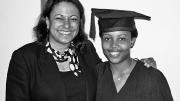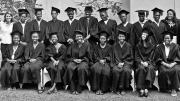Even though apartheid in South Africa ended more than a decade ago, public-school students still suffer ill-effects from the previously segregated education system because their teachers were trained under it. “Teachers in black communities don’t have the same skills [as teachers at private schools],” says Teresa Clarke ’84, J.D.-M.B.A. ’89. “They’re challenged in educating young people today.”
Clarke went to South Africa in 1995 to start a branch office for the consulting firm Abt Associates. “In the back of my mind, I had a goal of making a lasting contribution [there],” she says. To this end, she founded the Student Sponsorship Programme (SSP) with Nyagaka Ongeri, M.B.A. ’97, in 2000. Their project (www.sspsa.org) provides academically talented but economically disadvantaged South African students with scholarships and support to attend private schools. Four hundred students have already benefited.
When Clarke lived in New York, she participated in Student Sponsor Partners, an organization that partners at-risk high-school youths with sponsors who not only mentor them but also pay their way at private high schools. Clarke saw an opportunity to export that program to South Africa—until she realized that even the most talented black South Africans lack access to top schools. “When the best and brightest were not being educated,” she says, “we needed to start with [them].”
Admission to SSP is extremely competitive, based on academic achievement and financial need. For the 2008 school year, Clark reports, more than 3,500 rising eighth-graders applied for 75 scholarships. Applicants take a four-hour test, and top scorers are invited for interviews. The students chosen typically represent the top 2 to 4 percent of the applicant pool.
The program pays for five years (at roughly $5,000 a year per pupil) at top secondary schools; 90 percent of that funding is local, mainly from corporations and foundations, and 10 percent is from large and small private donors in the United States. SSP also provides a mentor for each student, counseling as needed for students and their parents, and an intensive, five-day orientation for new students. Ninety percent of SSP participants have finished the program, Clarke notes—all of whom have gone on to college. Most attend South African universities, but in 2007, two SSP scholars were chosen in a nationwide search to attend Amherst College as Nelson Mandela Scholars.
SSP’s most pressing concern now is to provide extra support for newly orphaned or otherwise vulnerable students: the AIDS crisis in South Africa has caused 5 to 10 percent of SSP’s scholars to lose, or be at risk of losing, parents. Though most students enter the program with intact families (whose support is often what helps them do well on the entrance exam and gain the leadership skills needed to be admitted to SSP), Clarke says they may be orphaned as the years pass. SSP has responded by providing a boarding, rather than a day, program for some of these students, as well as additional counseling and mentoring.
Clarke, who now lives in New York and is a managing director at Goldman Sachs, says her time in South Africa was a “truly liberating experience”—living in the country when it was “a brand-new democracy and relationships were being made from scratch.” SSP, in turn, was an opportunity “to use the knowledge and skills and experience that Nyagaka and I had gleaned from programs in the U.S., and apply it to a place that desperately needed it.”










